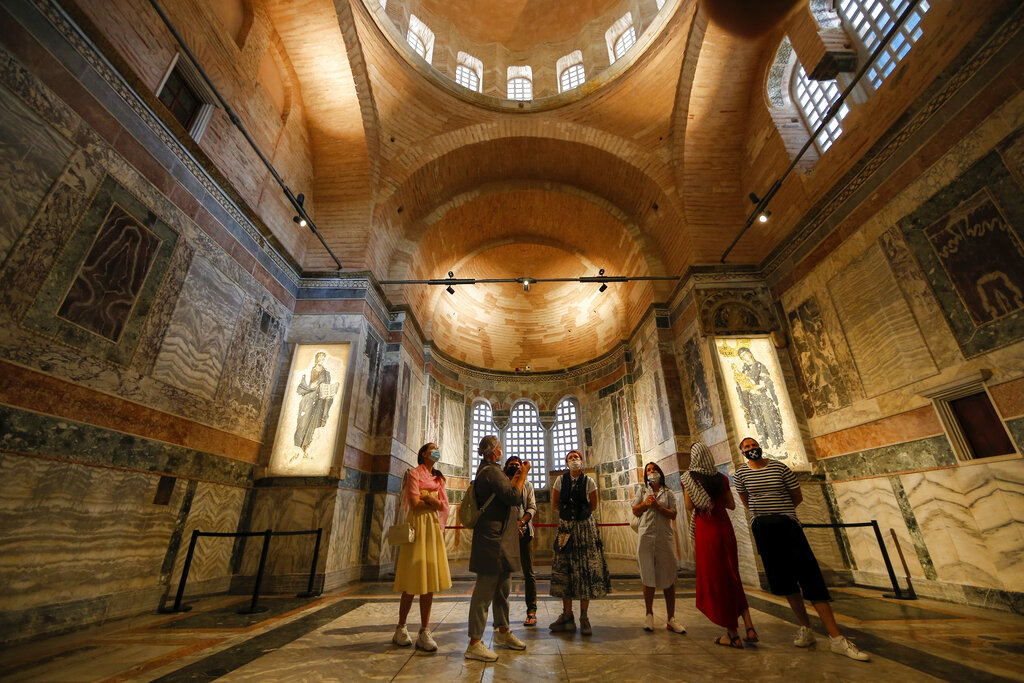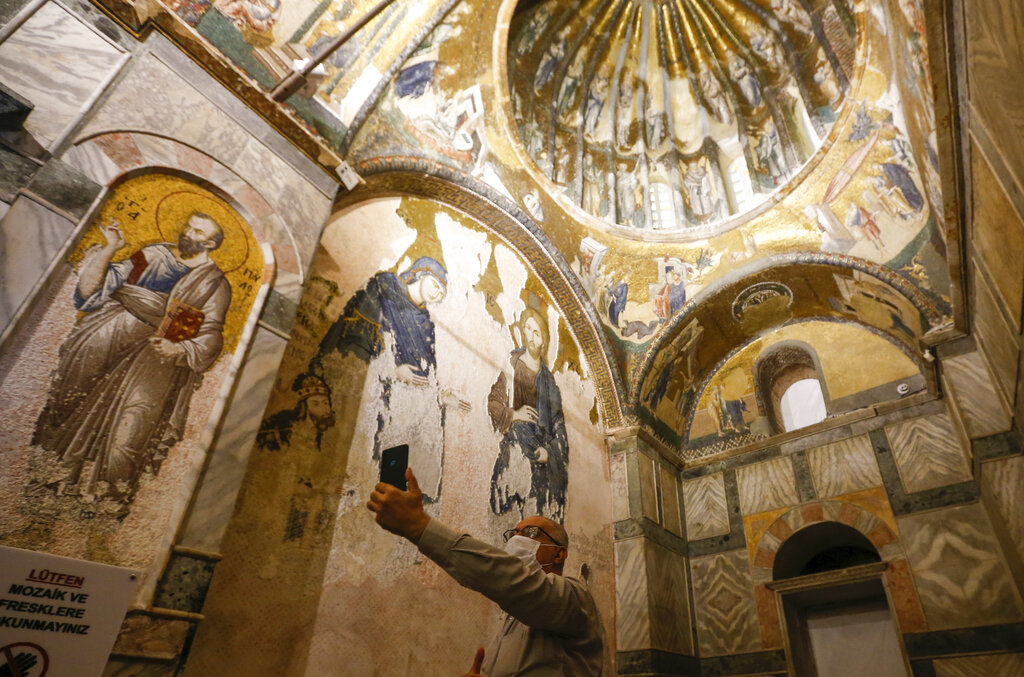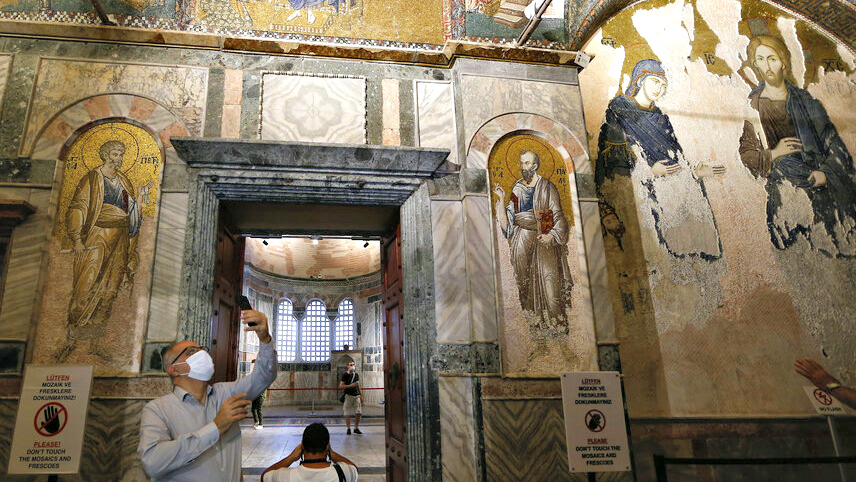The Turkish government formally converted a former Byzantine church into a mosque Friday, a move that came a month after it drew praise from the faithful and international opposition for similarly turning Istanbul’s landmark Hagia Sophia into a Muslim house of prayer.
A decision by President Recep Tayyip Erdogan, published in the country’s Official Gazette, said Istanbul’s Church of St. Saviour in Chora, known as Kariye in Turkish, was handed to Turkey’s religious authority, which would open up the structure for Muslim prayers.
Like the Hagia Sophia, which was a church for centuries and then a mosque for centuries more, the historic Chora church had operated as a museum for decades before Erdogan ordered it restored as a mosque.
The church, situated near the ancient city walls, is famed for its elaborate mosaics and frescoes. It dates to the fourth century, although the edifice took on its current form in the 11th–12th centuries.
The structure served as a mosque during the Ottoman rule before being transformed into a museum in 1945. A court decision last year canceled the building’s status as a museum, paving the way for Friday’s decision.
 Emrah Gurel / AP Photo
Emrah Gurel / AP PhotoAnd as with the Hagia Sophia, the decision to transform the Chora church museum back into a mosque is seen as geared to consolidate the conservative and religious support base of Erdogan’s ruling party at a time when his popularity is sagging amid an economic downturn.
Greece’s Foreign Ministry strongly condemned the move, saying that Turkish authorities “are once again brutally insulting the character” of another UN-listed world heritage site.
“This is a provocation against all believers,” the Greek ministry said in a statement. “We urge Turkey to return to the 21st century, and the mutual respect, dialogue and understanding between civilizations.”
Protestant believers agree.
“The Hagia Sophia is just another attack on us as Christians, and very sad for the Armenians, the Orthodox, and the Catholics,” Soner Tufan, head of Turkey’s estimated 7,000-member Protestant community, told CT last June, in anticipation of the initial court decision.
“The government doesn’t look after us, or give us our rights.”
A chief complaint of Protestants in Turkey has been the surge in denials for residency permit renewals of expatriate Christian workers, and the deportation of others. The total is now more than 50.
Elpidophoros, the Greek Orthodox archbishop of America, wrote on Twitter: “After the tragic transgression with Hagia Sophia, now the Monastery of Chora, this exquisite offering of Byzantine culture to the world!”
“The pleas and exhortations of the international community are ignored,” he wrote.
And while churches-turned-museums are being converted into mosques, other historic Christians buildings are left in disrepair.
The seventh century Cathedral of Mren, located near Kars on the Armenian border, like others, “could crumble to the ground any day now,” Christina Maranci, professor of Armenian Art and Architecture at Tufts University, told CT last July.
She believes Turkish policy toward its Christian heritage is often one of “slow bureaucracy and purposeful neglect.”
In a 1974 survey of the once numerous Armenian community, UNESCO documented 913 historic buildings [including churches] declared empty, 464 vanished completely, 252 in ruins, and 197 in need of restoration.
But the recent conversion of churches into mosques is not new. In 1993, Maranci observed such transformation of the 10th-century Cathedral of the Holy Apostles in Kars, on the Armenian border.
And in 2013, CT reported on the conversion of the smaller Church of Hagia Sophia, on the Black Sea coastal city of Trabzon.
“I’m not surprised by the declaration of Erdogan, it was very much in line with historic Turkish policy,” Arda Ekmekji, a Sorbonne-educated archaeologist and dean of arts and sciences at Lebanon’s Armenian evangelical Haigazian University, told CT in July.
“Ataturk was the only exception to extremist Turks camouflaged as Europeans.”
 Emrah Gurel / AP Photo
Emrah Gurel / AP PhotoSeveral Istanbul residents rushed to the building Friday, some hoping to hold prayers there, Turkey’s state-run Anadolu Agency reported.
“Like the Hagia Sophia, this is an important mosque for Muslims,” the agency quoted Istanbul resident Cuma Er as saying. “We came here to pray after we learned about the decision. But we have been told that it has not yet been opened for prayers. We are waiting for the opening.”
Last month, Erdogan joined hundreds of worshipers for the first Muslim prayers in Hagia Sophia in 86 years, brushing aside the international criticism and calls for the monument to be kept as a museum in recognition of Istanbul’s multi-faith heritage. As many as 350,000 took part in the prayers outside the structure.
It was not immediately known when the first prayers would be held in the newly converted Chora mosque.
“It is so sad,” said Tufan. “If you do not act, they will continue.”













